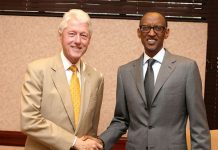The UK has suspended aid to Rwanda, amid concerns about the country’s role in the conflict in Democratic Republic of Congo.
Ministers said the UK would not now release a payment worth £21m.
An aid payment of £16m was paid to Rwanda in September despite question marks over its alleged support for the M23 militia in DR Congo.
The government also said it would give a further £18m for immediate humanitarian needs in the DR Congo.
International Development Secretary Justine Greening said £21m, which was due to be handed over to Rwanda next month, would not be released because President Paul Kagame’s regime had breached agreements.
The International Development Committee of the House of Commons (IDC) welcomed Ms Greening’s announcement but said the UK should continue to provide to Rwanda’s poor “via other means”.
‘Credible and compelling’
It comes just weeks after a controversial decision by Ms Greening’s predecessor, Andrew Mitchell, to authorise payment of £16m to Rwanda on his last day in the job in September.
Mr Mitchell, who had previously frozen aid to the country, cited progress at international talks as the reason for making the payment.
Half of the aid package was paid as “general budget support”, and half directly to the education and agriculture sectors.
The Prime Minister’s spokesman has denied that the decision to reinstate aid to Rwanda in September had been a mistake.
He said: “We stand by the decision that we made to release the last tranche of funding. This is our approach to the aid budget. We keep decisions under review.”
President Kagame’s regime has been praised for improving the economic and social conditions in the east African country, in which it is estimated more than 800,000 people were killed in ethnic violence during 1994.
But Mr Kagame, in power since 2000, has come under fierce criticism recently for allegedly funding the M23 rebel group in the east of the Democratic Republic of Congo (DRC).
Downing Street said David Cameron had raised concerns with Mr Kagame when he spoke to him by telephone a few weeks ago.
‘Human rights’
IDC member Richard Burden MP said he welcomed Ms Greening’s decision to “resuspend general budget support” to Rwanda.
He added: “People in that part of Africa are desperately poor but, in the light of the evidence given to the United Nations as well as the UK Government, it is important that aid now gets to the people of Rwanda via means other than general support for Rwandan government spending.”
A report produced by the IDC has concluded that the UK should continue to provide aid to the country, but that “the best way to deliver this assistance should be reconsidered”.
It added that the Department for International Development (Dfid) should “place greater emphasis on the human rights aspect of its partnership” with Rwanda.
A UN document says Rwanda’s defence minister is effectively commanding the rebellion.
The violence has drawn international condemnation and the US and some European countries have withheld aid from the Kagame regime.
The BBC has uncovered evidence Rwandan support for the rebels may be more widespread than previously believed.
Ms Greening said: “The government has already set out its concerns over credible and compelling reports of Rwandan involvement with M23 in DRC.
“This evidence constitutes a breach of the partnership principles set out in the memorandum of understanding, and as a result I have decided not to release the next payment of budget support to Rwanda.
“We are committed to finding lasting solutions to the conflict in this region and will work with the governments of Rwanda and DRC to secure a peaceful resolution to the situation in eastern DRC.”
Pressure group the TaxPayers’ Alliance, which campaigns for lower taxes, said it was “appalling” that any taxpayers’ money had gone “directly to a government involved in a proxy war”.
Campaign manager Robert Oxley added: “This announcement leaves a huge question mark over why Dfid, and specifically Andrew Mitchell, reinstated the aid programme to the Rwandan government which was fanning the flames of conflict in DRC.
“Justine Greening must urgently re-examine our aid policy. It is wrong to keep increasing Dfid’s budget in pursuit of an arbitrary spending target when it cannot be trusted with the significant amount of money taxpayers already hand over.”
Mark Doyle
BBC International Development Correspondent
The rebel advance in recent weeks has made tens of thousands of Congolese homeless.
Britain is increasing its aid to Congo by £18m to help them.
Although these moves will annoy the Rwandan government and please the authorities in Congo, they are unlikely to change the fundamentals of the war.
Rwanda backs one set of rebels because the weak Congolese government allows another armed group, which is opposed to the government in Rwanda, to operate from Congolese soil.
Adjusting British aid flows is unlikely to change that situation anytime soon.































































